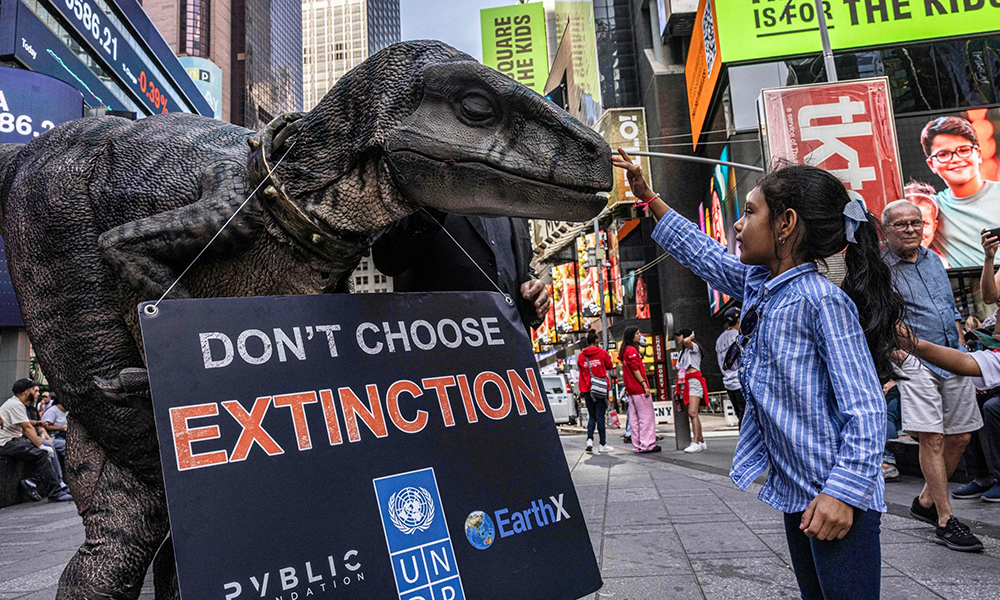
長(zhǎng)期以來(lái),,世界各國(guó)一直在談?wù)摷涌鞖夂蛐袆?dòng),。隨著聯(lián)合國(guó)大會(huì)(UN General Assembly)和紐約氣候周(New York Climate Week)正在如火如荼地進(jìn)行,“加速”一詞在許多會(huì)議的議程上仍然很突出,。那么,,正如聯(lián)合國(guó)秘書(shū)長(zhǎng)安東尼奧·古特雷斯在兩周前所說(shuō),為什么氣候行動(dòng)停滯不前,?需要做什么才能夠讓世界各國(guó)采取行動(dòng),?
確實(shí),能源轉(zhuǎn)型正在面臨強(qiáng)大的阻力,。近期,,新冠疫情和俄烏沖突對(duì)全球市場(chǎng)和經(jīng)濟(jì)產(chǎn)生了前所未有的影響。隨著國(guó)家財(cái)政受到影響,,經(jīng)濟(jì)沖擊會(huì)影響每個(gè)人,,一些人對(duì)加快能源轉(zhuǎn)型的必要性提出了質(zhì)疑,。
在這些新的質(zhì)疑之外,,事實(shí)是世界各國(guó)在脫碳方面的進(jìn)展非常緩慢,遠(yuǎn)未達(dá)到必須實(shí)現(xiàn)的水平,。世界上80%的能源消耗仍然來(lái)自化石燃料,,而20%來(lái)自電力。甚至,,60%的電力來(lái)自煤炭,、天然氣和石油發(fā)電。國(guó)際能源署(IEA)預(yù)測(cè),,在2021年至2026年期間,,全球可再生能源將比前五年增加60%。但國(guó)際能源署也指出,,這一趨勢(shì)無(wú)法到2050年實(shí)現(xiàn)凈零排放(Net Zero),。
全球向清潔能源的轉(zhuǎn)變正在以慢跑的速度進(jìn)行,而不是以所需要的沖刺速度進(jìn)行,,這一事實(shí)應(yīng)該給我們所有人敲響警鐘,。
然而,有真正明亮的燈塔出現(xiàn),。到目前為止,,可再生能源給環(huán)境帶來(lái)的積極影響包括能源自給自足、改善貿(mào)易平衡和增加工業(yè)發(fā)展機(jī)會(huì),,這些積極影響毫無(wú)疑問(wèn)讓清潔電力的其他優(yōu)勢(shì)黯然失色,。最后同樣重要的是,改用可再生能源可以降低能源成本,,提高競(jìng)爭(zhēng)力,。這些優(yōu)勢(shì)終于開(kāi)始得到應(yīng)有的關(guān)注,。
在當(dāng)前地緣政治發(fā)展的推動(dòng)下,能源轉(zhuǎn)型難題的重要部分已經(jīng)出現(xiàn),,而其他一些部分正在匯集起來(lái),。在過(guò)去的兩個(gè)月里,許多排放大國(guó)——美國(guó),、歐盟(EU)和澳大利亞已經(jīng)提高了清潔能源推廣目標(biāo),。私營(yíng)企業(yè)也在以創(chuàng)紀(jì)錄的水平加大投資,以大幅擴(kuò)大清潔能源項(xiàng)目的交付——投資者對(duì)提供綠色融資越來(lái)越感興趣,。Iberdrola在可再生能源和電力網(wǎng)絡(luò)方面已經(jīng)是世界領(lǐng)先企業(yè),,目前運(yùn)營(yíng)規(guī)模達(dá)4萬(wàn)兆瓦,其目標(biāo)是在短短十年內(nèi)將其可再生能源產(chǎn)能增加一倍以上,。
然而,,重大障礙依然存在。地方,、國(guó)家和國(guó)際的政策和法規(guī)往往不一致,。例如,一個(gè)只需12個(gè)月就能夠完成的大型清潔能源項(xiàng)目,,卻仍然需要五年以上的時(shí)間才可以從多個(gè)政府部門獲得許可,。行政流程不應(yīng)該比交付急需的兆瓦級(jí)綠色電力或強(qiáng)化可實(shí)現(xiàn)電力分配的電網(wǎng)多花五倍的時(shí)間。此外,,歐盟(European Union)里的一些國(guó)家的干預(yù)主義阻礙了投資,,減緩了可再生能源的增長(zhǎng)和能源轉(zhuǎn)型本身。
可以迅速做出一些顯著的改進(jìn),,以完善世界上大多數(shù)國(guó)家的經(jīng)濟(jì),、政策和監(jiān)管框架,從而能夠加速可再生能源投資,。哥倫比亞大學(xué)(Columbia University)正在撰寫一份新報(bào)告,,旨在讓政策制定者對(duì)如何克服障礙有更清晰的認(rèn)識(shí),從而能夠擴(kuò)大可再生能源,、強(qiáng)化網(wǎng)絡(luò),,并改善其存儲(chǔ)基礎(chǔ)設(shè)施。
盡管自2015年巴黎氣候大會(huì)以來(lái),,許多國(guó)家發(fā)表的聲明都野心勃勃,,但世界上仍然有許多國(guó)家犯了政策錯(cuò)誤,或者其勇氣和緊迫感已經(jīng)消退,,這對(duì)那些不愿意改變?nèi)魏问虑榈娜藖?lái)說(shuō)是好消息,。但是,犯錯(cuò)本身就是學(xué)習(xí)機(jī)會(huì)——而這份報(bào)告旨在明確這些學(xué)習(xí)機(jī)會(huì)在哪里,。
上周在紐約出席活動(dòng)的政策制定者應(yīng)該承認(rèn),,當(dāng)前的逆風(fēng)實(shí)際上是能源轉(zhuǎn)型必須加快步伐的最后警告信號(hào),。化石燃料市場(chǎng)的混亂會(huì)給整個(gè)世界蒙上一層烏云,。是時(shí)候通過(guò)擴(kuò)大可再生能源,、強(qiáng)化網(wǎng)絡(luò)和改善存儲(chǔ)來(lái)加速推進(jìn)電氣化了。這是解決目前許多問(wèn)題的應(yīng)有之義,,不僅是在脫碳方面,,而且是在可負(fù)擔(dān)性、能源自主和供應(yīng)安全等領(lǐng)域,。
事實(shí)表明,,對(duì)化石燃料的過(guò)度依賴是造成氣候危機(jī)的原因,是造成當(dāng)前和以往能源緊急情況的原因,,也是造成幾個(gè)時(shí)期經(jīng)濟(jì)動(dòng)蕩的主要原因,。我們面前有一個(gè)可靠的替代方案,可以緩解氣候危機(jī),,保障能源安全,,并帶來(lái)廣泛的經(jīng)濟(jì)效益。我們必須克服阻礙,,改正錯(cuò)誤,,從而加速推動(dòng)可再生能源發(fā)展。
通過(guò)可再生能源推進(jìn)電氣化是各國(guó)迅速獲得安全,、清潔和廉價(jià)能源的唯一途徑。(財(cái)富中文網(wǎng))
伊格納西奧·加蘭(Ignacio Galán)是Iberdrola公司的董事長(zhǎng)兼首席執(zhí)行官,。
Fortune.com上的評(píng)論文章僅代表作者個(gè)人觀點(diǎn),,不代表《財(cái)富》雜志的觀點(diǎn)和立場(chǎng)。
譯者:中慧言-王芳
長(zhǎng)期以來(lái),,世界各國(guó)一直在談?wù)摷涌鞖夂蛐袆?dòng),。隨著聯(lián)合國(guó)大會(huì)(UN General Assembly)和紐約氣候周(New York Climate Week)正在如火如荼地進(jìn)行,“加速”一詞在許多會(huì)議的議程上仍然很突出,。那么,,正如聯(lián)合國(guó)秘書(shū)長(zhǎng)安東尼奧·古特雷斯在兩周前所說(shuō),為什么氣候行動(dòng)停滯不前,?需要做什么才能夠讓世界各國(guó)采取行動(dòng),?
確實(shí),能源轉(zhuǎn)型正在面臨強(qiáng)大的阻力,。近期,,新冠疫情和俄烏沖突對(duì)全球市場(chǎng)和經(jīng)濟(jì)產(chǎn)生了前所未有的影響。隨著國(guó)家財(cái)政受到影響,,經(jīng)濟(jì)沖擊會(huì)影響每個(gè)人,,一些人對(duì)加快能源轉(zhuǎn)型的必要性提出了質(zhì)疑,。
在這些新的質(zhì)疑之外,事實(shí)是世界各國(guó)在脫碳方面的進(jìn)展非常緩慢,,遠(yuǎn)未達(dá)到必須實(shí)現(xiàn)的水平,。世界上80%的能源消耗仍然來(lái)自化石燃料,而20%來(lái)自電力,。甚至,,60%的電力來(lái)自煤炭、天然氣和石油發(fā)電,。國(guó)際能源署(IEA)預(yù)測(cè),,在2021年至2026年期間,全球可再生能源將比前五年增加60%,。但國(guó)際能源署也指出,,這一趨勢(shì)無(wú)法到2050年實(shí)現(xiàn)凈零排放(Net Zero)。
全球向清潔能源的轉(zhuǎn)變正在以慢跑的速度進(jìn)行,,而不是以所需要的沖刺速度進(jìn)行,,這一事實(shí)應(yīng)該給我們所有人敲響警鐘。
然而,,有真正明亮的燈塔出現(xiàn),。到目前為止,可再生能源給環(huán)境帶來(lái)的積極影響包括能源自給自足,、改善貿(mào)易平衡和增加工業(yè)發(fā)展機(jī)會(huì),,這些積極影響毫無(wú)疑問(wèn)讓清潔電力的其他優(yōu)勢(shì)黯然失色。最后同樣重要的是,,改用可再生能源可以降低能源成本,,提高競(jìng)爭(zhēng)力。這些優(yōu)勢(shì)終于開(kāi)始得到應(yīng)有的關(guān)注,。
在當(dāng)前地緣政治發(fā)展的推動(dòng)下,,能源轉(zhuǎn)型難題的重要部分已經(jīng)出現(xiàn),而其他一些部分正在匯集起來(lái),。在過(guò)去的兩個(gè)月里,,許多排放大國(guó)——美國(guó)、歐盟(EU)和澳大利亞已經(jīng)提高了清潔能源推廣目標(biāo),。私營(yíng)企業(yè)也在以創(chuàng)紀(jì)錄的水平加大投資,,以大幅擴(kuò)大清潔能源項(xiàng)目的交付——投資者對(duì)提供綠色融資越來(lái)越感興趣。Iberdrola在可再生能源和電力網(wǎng)絡(luò)方面已經(jīng)是世界領(lǐng)先企業(yè),,目前運(yùn)營(yíng)規(guī)模達(dá)4萬(wàn)兆瓦,,其目標(biāo)是在短短十年內(nèi)將其可再生能源產(chǎn)能增加一倍以上。
然而,重大障礙依然存在,。地方,、國(guó)家和國(guó)際的政策和法規(guī)往往不一致。例如,,一個(gè)只需12個(gè)月就能夠完成的大型清潔能源項(xiàng)目,,卻仍然需要五年以上的時(shí)間才可以從多個(gè)政府部門獲得許可。行政流程不應(yīng)該比交付急需的兆瓦級(jí)綠色電力或強(qiáng)化可實(shí)現(xiàn)電力分配的電網(wǎng)多花五倍的時(shí)間,。此外,,歐盟(European Union)里的一些國(guó)家的干預(yù)主義阻礙了投資,減緩了可再生能源的增長(zhǎng)和能源轉(zhuǎn)型本身,。
可以迅速做出一些顯著的改進(jìn),,以完善世界上大多數(shù)國(guó)家的經(jīng)濟(jì)、政策和監(jiān)管框架,,從而能夠加速可再生能源投資,。哥倫比亞大學(xué)(Columbia University)正在撰寫一份新報(bào)告,旨在讓政策制定者對(duì)如何克服障礙有更清晰的認(rèn)識(shí),,從而能夠擴(kuò)大可再生能源,、強(qiáng)化網(wǎng)絡(luò),并改善其存儲(chǔ)基礎(chǔ)設(shè)施,。
盡管自2015年巴黎氣候大會(huì)以來(lái),,許多國(guó)家發(fā)表的聲明都野心勃勃,但世界上仍然有許多國(guó)家犯了政策錯(cuò)誤,,或者其勇氣和緊迫感已經(jīng)消退,,這對(duì)那些不愿意改變?nèi)魏问虑榈娜藖?lái)說(shuō)是好消息。但是,,犯錯(cuò)本身就是學(xué)習(xí)機(jī)會(huì)——而這份報(bào)告旨在明確這些學(xué)習(xí)機(jī)會(huì)在哪里,。
上周在紐約出席活動(dòng)的政策制定者應(yīng)該承認(rèn),當(dāng)前的逆風(fēng)實(shí)際上是能源轉(zhuǎn)型必須加快步伐的最后警告信號(hào),。化石燃料市場(chǎng)的混亂會(huì)給整個(gè)世界蒙上一層烏云,。是時(shí)候通過(guò)擴(kuò)大可再生能源,、強(qiáng)化網(wǎng)絡(luò)和改善存儲(chǔ)來(lái)加速推進(jìn)電氣化了。這是解決目前許多問(wèn)題的應(yīng)有之義,,不僅是在脫碳方面,,而且是在可負(fù)擔(dān)性、能源自主和供應(yīng)安全等領(lǐng)域,。
事實(shí)表明,,對(duì)化石燃料的過(guò)度依賴是造成氣候危機(jī)的原因,是造成當(dāng)前和以往能源緊急情況的原因,也是造成幾個(gè)時(shí)期經(jīng)濟(jì)動(dòng)蕩的主要原因,。我們面前有一個(gè)可靠的替代方案,,可以緩解氣候危機(jī),保障能源安全,,并帶來(lái)廣泛的經(jīng)濟(jì)效益,。我們必須克服阻礙,改正錯(cuò)誤,,從而加速推動(dòng)可再生能源發(fā)展,。
通過(guò)可再生能源推進(jìn)電氣化是各國(guó)迅速獲得安全、清潔和廉價(jià)能源的唯一途徑,。(財(cái)富中文網(wǎng))
伊格納西奧·加蘭(Ignacio Galán)是Iberdrola公司的董事長(zhǎng)兼首席執(zhí)行官,。
Fortune.com上的評(píng)論文章僅代表作者個(gè)人觀點(diǎn),不代表《財(cái)富》雜志的觀點(diǎn)和立場(chǎng),。
譯者:中慧言-王芳
The world has been talking about accelerating climate action for a very long time. With the UN General Assembly and New York Climate Week in full swing, the word “acceleration” remains prominent on the agendas in many of the meetings. So why, as UN Secretary-General António Guterres stated at two weeks ago, is climate action flatlining? And what needs to be done to jolt the world into action?
It is true that the energy transition is facing powerful headwinds. COVID, and the invasion of Ukraine by Russia, have impacted global markets and economies like nothing else in recent times. With national finances impacted, and economic shocks affecting everyone in society, some have raised doubts about the need to speed up the energy transition.
These new doubts come on top of the fact that the world’s progress toward decarbonization was already slower than necessary. 80% of the world’s energy consumption is still covered by fossil fuels, versus 20% by electricity. And even, 60% of this electricity is produced with coal, natural gas, and oil. The IEA forecasts that between 2021 and 2026 the world will see 60% more renewables come online than we did than in the previous five years. But the IEA also points out that this trend is not on track to meet its own Net Zero by 2050 Scenario.
The fact that the global switch to clean energy is moving at a jogging pace rather than the required sprint should alarm us all.
There are, however, real beacons of light. Until now, the unquestionably positive environmental impacts of renewable energies have overshadowed the other benefits of clean electricity: energy self-sufficiency, improvements in trade balance, and opportunities for industrial development. Last, but not least, switching to renewable electricity reduces energy costs, improving competitiveness. These benefits are finally beginning to get the attention they deserve.
Significant pieces of the energy transition puzzle are already in place, and some others are coming together, driven by current geopolitical developments. Within the last two months, many big emitters–the U.S., EU, and Australia have upgraded ambitions on clean energy rollouts. Private companies are also investing at record levels to drastically scale up the delivery of clean energy projects – and there is increasing interest from investors to provide green finance. Iberdrola, already a world leader in renewable energy and power networks with 40,000 MW in operation, aims to more than double its renewable energy capacity in just a decade.
Substantial barriers do remain. Local, national, and international policies and regulations are all too often not aligned. For example, it can still take more than five years to gain permits from a wide range of authorities for a large clean energy project that can be built in just 12 months. Administrative processes should not take five times longer than the process of delivering urgently needed green megawatts or reinforcing the grid to distribute them. Also, the interventionism of some countries of the European Union discourages investments, slowing down the growth of renewables and the energy transition itself.
There are some obvious improvements that can be made quickly to strengthen economic, policy, and regulatory frameworks in most countries across the world to accelerate renewable energy investments. Columbia University is working on a new report that aims to give policymakers a sharper view on how to overcome obstacles to scaling renewables and network and storage infrastructures.
For all the ambitious statements since Paris in 2015, there are many countries around the world where policy mistakes have been made, or where courage and a sense of urgency have faded away, to the benefit of those who would like nothing to change. But mistakes are learning opportunities–and the report aims to make clear where those opportunities lie.
Policymakers In New York last week should acknowledge that the current headwinds are, in fact, the final warning sign needed to show that the energy transition must move much faster. Disruption in fossil fuel markets can cast a dark cloud over the whole world. It’s time to double down on electrification through renewables, networks, and storage. This is the answer to many of the current issues not only in decarbonization, but also in the areas of affordability, energy autonomy, and security of supply.
The facts show that overdependence on fossil fuels is the cause of the climate crisis, responsible for the current and previous energy emergencies, and largely to blame for several periods of economic turmoil. We have a credible alternative ahead of us that may alleviate the climate crisis, improve energy security, and deliver widespread economic benefits. We must overcome the obstacles and mistakes that are undermining the acceleration of renewables.
Electrification through renewable energies is the only way for countries to quickly have secure, safe, clean, and cheap energy.
Ignacio Galán is the chairman and CEO of Iberdrola.
The opinions expressed in Fortune.com commentary pieces are solely the views of their authors and do not reflect the opinions and beliefs of Fortune.






